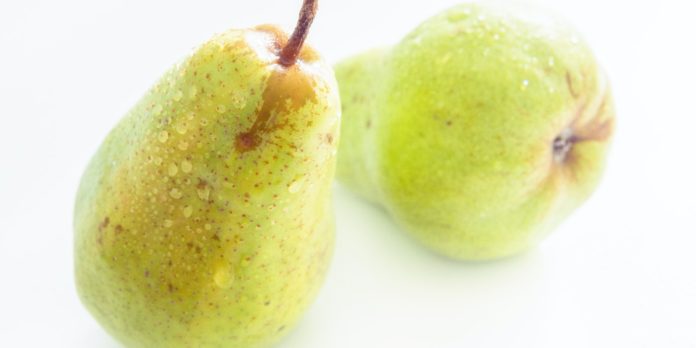What are Pears?
Pears are sweet and tasty pomaceous fruits with juicy flesh. They are very tasty. Several trees and bushes in the genus Pyrus are called “pears.” They belong to the larger family Rosaceae. There are numerous varieties of pear trees. However, just a handful of them produces fruit suitable for human consumption. Most pear trees and shrubs are only used for their looks.
Nutritional Values of Pears
Pears are a delightful, low-calorie food that is also packed with nutrients that are otherwise difficult to come by. The following is the nutritional composition of one medium-sized pear.
A serving contains 101 calories:
- 0-gram fat
- 0 g of saturated fat.
- 0 g trans fat
- There are 27 grams of carbohydrates.
- 6 g of dietary fiber.
- 17 g of sugar
- Sugar that has been added: 0 g
- 1 gram protein
- Magnesium: 12 milligrams.
- Potassium (206 milligrams)
- 8 milligrams of vitamin C
Pears also include a significant quantity of fiber, which helps to keep you feeling full while also keeping your heart and intestines healthy. Pears are extremely low in calories and have no added sugar, making them a healthy snack.
Health Benefits of Pear
Pears Can Improve Intestinal Health
Pears are a fantastic source of both soluble and insoluble fiber, both of which are necessary for digestive well-being. These fibers aid in the maintenance of regular bowel movements by softening and bulking up the stool.
A medium-sized pear (178 grams) contains 6 grams of fiber, which accounts for about 22% of your daily fiber needs.
Furthermore, soluble fibers provide food for the beneficial microorganisms in your stomach. Therefore, they’re called prebiotics, which has been linked to healthy aging as well as better immune function.
Improves the Health of the Heart
Numerous studies and research articles have been published that have highlighted the beneficial effects of pears on heart health. According to these studies, Pears are one of the fruits whose consumption is associated with a decreased risk of heart attack or stroke. The fact that pear fruit contains a high concentration of potassium indicates that the fruit has a major impact on the health of the heart. As a potent vasodilator, potassium aids in the decrease of high blood pressure.
An upsurge in blood flow throughout the body helps to transport oxygen to the organs and tissues more efficiently. Improved oxygenation of the organs results in greater efficiency in the performance of those organs’ functions. If you have a cardiac issue or wish to avoid getting one, pears should be a regular part of your daily diet. Pears also have a high fiber level, which is beneficial for heart health.
Pear Has Useful Plant Components
Pears contain a variety of useful plant chemicals, which are responsible for the various colors of the fruit.
For example, anthocyanins are responsible for the ruby-red color of some pears. These chemicals have the potential to boost heart health while also strengthening blood vessels.
Despite the fact that further research on pear anthocyanins is needed, multiple population studies have found that a high intake of anthocyanin-rich foods such as berries is related to a lower risk of heart disease. Pears with green skin contains lutein and zeaxanthin, two antioxidants that are essential for maintaining good vision, especially as you become older.
Once again, the skin contains a high concentration of several of these beneficial plant components.
It Aids in the Healing Process
Pears are an amazing source of vitamin C, which is thought to speed up the healing of wounds. When it comes to the maturation of new organ tissues and cellular structures, ascorbic acid plays an important role. As a result, whenever a burn or cut occurs, it ensures that the affected region heals as rapidly as possible. If you have been hurt, you should eat pears to help your body heal.
Cancer-fighting Properties are Present
Pears include a number of chemicals that have been shown to have anticancer effects. According to research, the anthocyanin and cinnamic acid concentration of blueberries can help prevent cancer.
A few studies have shown that consuming a diet heavy in fruits, particularly pears, may help prevent various malignancies, including lung, stomach, and bladder cancer, in some people. The flavonoid content of pears, for example, has been shown in some population studies to be protective against breast and ovarian cancer, making them a particularly smart choice for female customers.
Aids in the Improvement of Blood Circulation
Because pears contain a high concentration of iron and copper, they can be quite beneficial for people suffering from mineral shortages such as anemia. The body’s ability to produce more red blood cells is aided by an increase in iron levels.
 A higher concentration of copper in the bloodstream, on the other hand, assists in the formation of vital minerals as well as the absorption of iron into the system.
A higher concentration of copper in the bloodstream, on the other hand, assists in the formation of vital minerals as well as the absorption of iron into the system.
Providing your body with sufficient minerals to support the organs might help you avoid muscle weakness, cognitive dysfunction, weariness, and organ system malfunction. This is why doctors advise both children and adults to take foods that are high in copper and iron at suitable levels. Eating pears can provide a significant amount of this essential mineral in your diet.
Pears Can Lower inflammation
The antioxidant and flavonoid components of the fruit have been shown to have anti-inflammatory effects in the body, which can help to reduce the discomfort and swelling associated with inflammation in some people. This can include the alleviation of symptoms associated with arthritis, rheumatic disorders, gout, and other comparable conditions.
Pears Have a Low Glycemic Index, Making Them a Healthy Snack
Despite the fact that pears contain some natural sugar, their substantial fiber content assures that your blood sugar will not surge after you consume one (which makes them a perfect on-the-go snack for people with diabetes). Furthermore, because they have a low glycemic index, you won’t feel hungry for several hours after eating one.
Beneficial for the Skin and Hair
Pears are beneficial to both your skin and hair. Vitamin A is the most adaptive of all the nutrients in the body. It is beneficial for maintaining the health and beauty of the skin, hair, and nails. Pears have high levels of vitamin A, which can assist in maintaining the health of your skin and hair. Additionally, it contains nutrients like zeaxanthin and lutein, which have a role in a number of organ functions and enzymatic reactions. This also aids in the preservation of youthful skin by reducing the appearance of age spots and wrinkles. Increase your intake of vitamin A if you wish to have healthy skin and hair. Pear is one of the fruits that contain a high concentration of this mineral, allowing you to meet your necessary daily consumption.
Improves Bone Health
The condition of one’s bones is critical. In high concentrations, copper, calcium, phosphorus, manganese, and magnesium may all be found in the fruit, and they all recreate a pivotal part in the health and development of the bones. However, even though these minerals are only required in small amounts, they serve a key role in the maintenance of bone strength and elasticity. The inclusion of pears in one’s diet is recommended for those who suffer from conditions such as osteoporosis since it can aid in the prevention and treatment of catastrophic conditions such as bone mineral loss and bone fractures. It ensures that your bones receive the nutrients they require to grow and protect them from inflammation and other ailments.
Are Pears Suitable for Everyone?
Some people are allergic to pears, particularly those who are allergic to the birch pollen group of plants, which includes pears. Within minutes of vulnerability to an allergen, a person’s mouth or throat may itch, their skin may turn red, or they may cough. If you encounter an allergic reaction, you should consult your doctor immediately.
Anaphylaxis is a severe allergic reaction that necessitates rapid medical attention if more serious symptoms such as trouble breathing, lightheadedness, or blue lips are manifest.
 Pears contain a high concentration of fructose and sorbitol, which are natural sugars that some people have difficulty digesting. Pears may cause irritable bowel syndrome-like symptoms in such individuals.
Pears contain a high concentration of fructose and sorbitol, which are natural sugars that some people have difficulty digesting. Pears may cause irritable bowel syndrome-like symptoms in such individuals.
FAQs
Q. Are Pears Beneficial During Pregnancy?
A. Pears are high in vitamins, minerals, and fiber, which are helpful for a healthy pregnancy.
Q. Can Pears Help a Diabetic Patient?
A. The fiber in pears slows digestion and keeps blood sugar levels steady. Pears contain anthocyanins, which help manage blood sugar levels.
Q. How Many Pears may a Person Consume in a Single Day?
A. 1-2 pears every day. Pears, like all fruits, are high in fructose, which can cause digestive difficulties. So stick to 1 or 2 every day to get the correct amount of nutrients for your body.
Q. Can We Eat Pears with a Cough or Cold?
A. Pears are high in vitamin C, which helps prevent colds and flu.
Q. Is it True that Eating Pears Cause Gas?
A. In some people, pears’ high fiber content causes bloating and gas. Avoid eating pears with other foods and chewing them carefully to avoid gas development.




